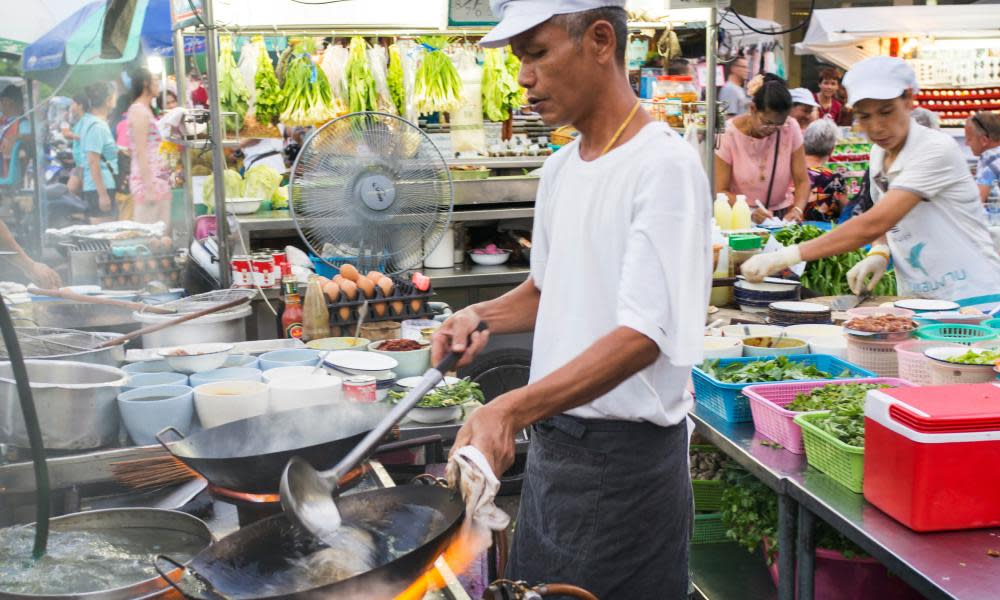Do online recipes come with too much backstory? It’s all part of the joy of food

These days just about every recipe in the world is only a Google search away.
But click through to the results and instead of a neat set of instructions often you’re wading through a meandering, 1,000-word story of the dish’s reception by Mary’s two little “fussy eaters” (spoiler alert: they ate it all and asked for seconds), or Sam and Lucy’s trip to Thailand where they found a “little stall” in a “little alleyway” where their Pad Thai was prepared by “adorable little man” who spoke no English (they managed to order by pointing at things).
Just skip to the recipe, you might think. But before you roll your eyes at every cook’s personal story, think of the alternative. Although recipes are transactional by their nature, they should never exist in isolation. Food is not a bare set of ingredients and instructions.
This is the major problem with modern eating - a constant attempt to strip food of its cultural and historical context and reduce it to a set of single-meal instructions. And we wonder why food now poses so many problems for health, environment etc. when it never did before. https://t.co/kxvyvVlCT0
— Adam Liaw (@adamliaw) February 16, 2019
By removing the cultural framework from food, we lose the centuries of wisdom it contains. Throughout human civilisation, food has codified every aspect of culture: science, health, geography, economics, relationships, and even politics.
The Chinese philosopher Confucius considered food one of three foundations of a stable state, along with military might and the trust of the people. He also placed emphasis on feasts, and not just because he liked parties.
The act of feasting gave people something to look forward to. It brought families together to prepare and enjoy the feast together. It encouraged cooperation, for farmers to build relationships with their neighbours. It stimulated economies, and united communities around common beliefs.
In a time before microbiology, dietitians and epidemiology, the proper preparation of food was the single greatest factor in public health. Assuming this is no longer the case gives our modern world too much credit.
Seasonal dishes taught us the natural rhythms of agriculture, and excess produce brought the benefits of preservation and fermentation. The composition of our meals represented sustainable land management, rather than an environment wrung of every last drop of life to bring us three meals of meat a day, seven days a week.
What we ate taught us domestic efficiency. We didn’t need 30-minute recipes a century ago, many were prepared in much less time. The idea that we were always cooking for hours on end is the great myth of the convenience economy. I’ve seen meals for 10 prepared over wood-fired stoves in rural China where the hard work was over and done with in barely a quarter of an hour.
All this information of how to live life and operate in a society was not communicated through pamphlets or TV commercials, or influencers with 500,000 followers (though in some cases they were, like when Pythagoras forbade his cult of followers from eating beans.) It was intrinsic to the food we ate and the culture it embodied. Shared one meal at a time, again and over again.
This loss of the institutional knowledge of food is a gap that’s being filled. Food systems, which through history were largely self-regulated through unwritten food culture, are now being controlled by external forces. The way we eat is now led by marketers who want to influence, businesses who want to sell, and economies who care for their own bottom lines more than our health, wealth, happiness or even our continued existence. We’re trying in vain to piece together food culture ourselves, dish by dish. The blind being led by those who may not be travelling in the same direction.
When the wellness mob was full-throatedly shouting the praises of high-saturated fat coconut oil as a health food (largely without scientific basis), the response from populations of Asia who had been cooking with it for thousands of years can be best described as incredulous confusion. I’m not saying all of southeast Asia has been working off peer-reviewed scientific journals when preparing dinner, but the wisdom of crowds is a true wisdom, particularly when that crowd has been gathered for millennia.
The food we eat is constantly evolving and our culture codified within that. You may wince when you read it in an overly sentimental blog, but at a population level Mary’s heartfelt tale of being taught a Victoria sponge at her grandmother’s apron strings (and even the story of Sam and Lucy’s tour of Thailand) is documentation of that evolution.
Strip a recipe of its context and you strip it of everything that it can teach you. And at the end of everything, all you’re left with is an empty plate.

 Yahoo News
Yahoo News 
